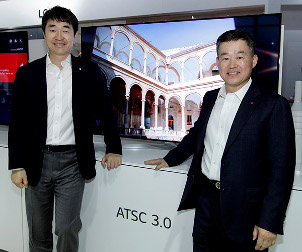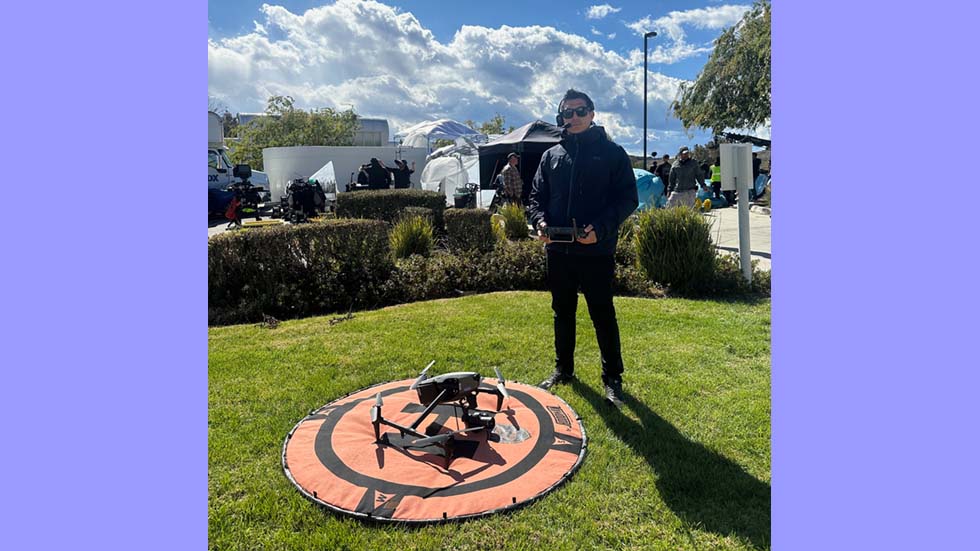CES 2017: LG Intros First ATSC 3.0 4KTVs
LAS VEGAS—LG Electronics is introducing the first ATSC 3.0-enabled 4K Ultra HD TVs to support this year’s historic nationwide deployment of the Next-Gen TV broadcast standard in South Korea. Starting this spring—in advance of the 2018 Winter Olympics—new 2017 models of LG 4K Ultra HD TVs and large-screen LG smart TVs sold in Korea will have both ATSC 3.0 and ATSC 1.0 tuners, the company announced at CES 2017.

LG Electronics is launching the first ATSC 3.0-equipped 4K Ultra HD TVs in Korea as SBS and other Korean broadcasters begin Next-Gen TV broadcasting this spring in advance of the 2018 Winter Olympics. At CES 2017, Suk-Mynn Yoon, CEO and vice chairman of SBS Media Holdings, (left) was briefed by Dr. Jong Kim, senior vice president, LG Electronics Office of the chief technology officer and president, of LG’s Zenith R&D Lab. At CES, one of these new models—a 65-inch class LG LED TV with an embedded second-generation ATSC 3.0 tuner—is displaying 4K UHD high-dynamic range broadcast programming. LG also is demonstrating ATSC 3.0’s advanced electronic service guide capabilities. They include broadcast video-on-demand and a program guide delivered by the Real-Time Object Delivery over Unidirectional Transport, or ROUTE protocol, specified in the nearly finalized ATSC 3.0 standard.
LG’s early introduction of ATSC 3.0-enabled TVs builds on the company’s key role in the development of the ATSC 3.0 suite of standards, especially the approved A/322 Physical Layer Standard at the heart of the new broadcast system that will merge the capabilities of broadcast and broadband for the first time.
Core technologies developed by LG and its U.S. R&D lab Zenith are included in the majority of the ATSC 3.0 Physical Layer Standard. LG contributions to the A/322 transmission system include the scrambler, forward error correction, bit interleaver, mapper, time interleaver, OFDM framer, frequency interleaver, pilots, reserved tones, and guard interval functions.
Expected to redefine TV broadcasting for decades to come, the Internet Protocol-based ATSC 3.0 broadcast standard will deliver 4K UHD services, robust reception on mobile devices and improved spectrum efficiency. The increased payload capacity of the physical layer combined with HEVC encoding will allow broadcasters more options when planning their broadcast services. A majority of the ATSC 3.0 suite of standards has been approved or is in the final stages of approval, expected to be completed this spring.
Development of ATSC 3.0 technologies represents the latest LG/Zenith innovation in digital television, which also includes key technologies in the A/153 Mobile Digital TV Standard adopted by the industry in 2009. Zenith also invented the core transmission system at the heart of today’s ATSC A/53 Digital Television Standard, approved by the U.S. Federal Communications Commission in 1996.
“In parallel with our extensive standards development work with the ATSC, LG has been collaborating with Korean broadcasters and the Korean government to support the Next-Gen TV launch this year,” said Brian Kwon, president of the LG Home Entertainment Company. “The combination of the latest ATSC 3.0 chipset with our industry-leading LG 4K OLED and LG Super UHD displays will deliver the promise of Next-Gen TV for consumers in Korea. Early availability of ATSC 3.0 products in Korea also sets the stage to support U.S. broadcasters’ Next-Gen TV rollout plans in 2018 and beyond,” he said.
LG’s new ATSC 3.0 TVs for the Korean market are being demonstrated at CES through Jan. 8, Las Vegas Convention Center, Central Hall Booth #11100.
See more TV Technology coverage at our ATSC 3.0 silo.
Get the TV Tech Newsletter
The professional video industry's #1 source for news, trends and product and tech information. Sign up below.
